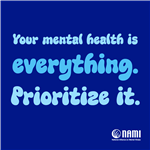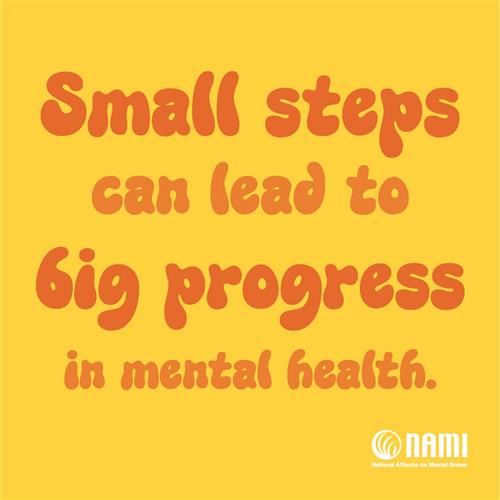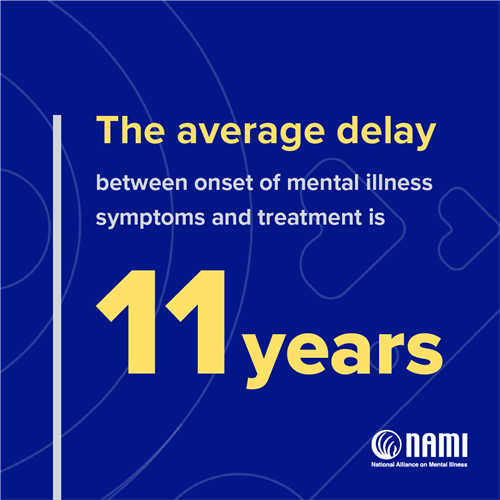Keller ISD Recognizes Mental Health Awareness Month
During the month of May, the Keller ISD Counseling Department will be spotlighting Mental Health Awareness Month with some helpful tips and valuable information and counseling resources available to students and families.
For additional counseling resources for KISD students and families, visit www.KellerISD.net/CounselingResources.
Week One - May is Mental Health Awareness Month
May is Mental Health Awareness Month in the United States. Since its inception in 1949, it has served as an opportunity to focus on or refocus on self-care, acknowledge the importance of mental health, and honor the courage of millions of people affected by mental illness. According to the CDC, mental health issues, such as depression that go untreated can increase the risk for long-term physical health issues, such as heart disease, stroke, and diabetes.
The National Alliance on Mental Illness (NAMI) mission is to support mental health care. This nonprofit organization is celebrating Mental Health Awareness Month with a Take the Moment campaign in hopes of destigmatizing mental health by normalizing the practice of taking moments to prioritize mental health care without guilt or shame.
Week Two - Mental Health Conditions Can Affect Anyone
May is Mental Health Awareness Month, a good reminder to focus on the importance of mental health and its impact on our well-being. Mental health conditions can affect anyone, regardless of gender, age, race, ethnicity, or income level. Our nation is facing an unprecedented mental health crisis among people of all ages and backgrounds, including young children and older adults. To put this into perspective, if you were standing in a room full of people, at least one out of every five of those people likely experienced anxiety, depression, or other mental health conditions in the last year. (SAMHSA.org)
Mental Health Action Day is May 16, providing an opportunity to take the next step from awareness to action for yourself, a loved one, or your community. This could be as simple as adopting a positive “mental health habit” like eating a balanced diet, getting a good night’s rest, or exercising, or offering support to a friend or family member who is struggling. Here are some additional strategies to consider on Mental Health Action Day.
- Practice gratitude: Think about what you’re thankful for – like supportive family and friends, a safe home, or even a beautiful day. Or find something to celebrate, like a recent accomplishment. Consciously practicing gratitude may reduce feelings of stress and anxiety.
- Volunteer: Participating in community organizations and finding opportunities to help others can provide a positive boost and sense of purpose.
- Engage in random acts of kindness: Buy a cup of coffee for the person in line behind you, hold the door open for a stranger, or make food for a neighbor or colleague. There are many small acts that can brighten someone else’s day.
- Practice mindfulness: Take a few minutes to meditate, take a yoga class or do some breathing exercises to promote relaxation and reduce stress.
- Seek Help: Whether it is for yourself of someone else, seek help through available resources.
For additional resources for Keller ISD students and families, visit www.KellerISD.net/CounselingResources.
Week Three - Out of the Darkness KISD Campus Walk
Saturday, May 18, join us at Cental High School as we partner with The American Foundation for Suicide Prevention on our Out of the Darkness KISD Campus Walk. This walk is designed to engage youth and young adults in the fight to prevent suicide, the second leading cause of death among people ages 15-24. The Out of the Darkness walk gives people the courage to open up about their own connections to the cause, and a platform to create a culture that’s smarter about mental health. Friends, family members, neighbors and coworkers walk side-by-side, supporting each other and in memory of those we’ve lost. Suicide is preventable and mental health is just as important as physical health. Together we can change the conversation and create a world without suicide.
For additional resources, visit www.KellerISD.net/CounselingResources.
Week Four - Mental Health Facts
- 1 in 5 U.S. adults experience mental illness each year, and only half of them receive treatment.
- 1 in 6 U.S. youth experience a mental health condition each year, and only half of them receive treatment.
- 50% of all lifetime mental illness begins by age 14, and 75% by age 24.
- The average delay between onset of mental illness symptoms and treatment is 11 years.
- In 2020, there was a 31% increase in mental health-related emergency department visits among adolescents.
If you are experiencing a mental health crisis: Call, chat or text 988 to speak with a trained crisis counselor 24 hours a day, 7 days a week.
For additional resources, visit www.KellerISD.net/CounselingResources.
Week Five - Identifying Warning Signs and Symptoms of Mental Health
Trying to tell the difference between what expected behaviors are and what might be the signs of a mental illness isn’t always easy. There’s no easy test that can let someone know if there is mental illness or if actions and thoughts might be typical behaviors of a person or the result of a physical illness.
Each illness has its own symptoms, but common signs of mental illness in adults and adolescents can include the following:
- Excessive worrying or fear
- Feeling excessively sad or low
- Confused thinking or problems concentrating and learning
- Extreme mood changes, including uncontrollable “highs” or feelings of euphoria
- Prolonged or strong feelings of irritability or anger
- Avoiding friends and social activities
- Difficulties understanding or relating to other people
- Changes in sleeping habits or feeling tired and low energy
- Changes in eating habits such as increased hunger or lack of appetite
- Difficulty perceiving reality (delusions or hallucinations, in which a person experiences and senses things that don’t exist in objective reality)
- Inability to perceive changes in one’s own feelings, behavior or personality (”lack of insight” or anosognosia)
- Overuse of substances like alcohol or drugs
- Multiple physical ailments without obvious causes (such as headaches, stomach aches, vague and ongoing “aches and pains”)
- Thinking about suicide
- Inability to carry out daily activities or handle daily problems and stress
- An intense fear of weight gain or concern with appearance
Mental health conditions can also begin to develop in young children. Because they’re still learning how to identify and talk about thoughts and emotions, their most obvious symptoms are behavioral. Symptoms in children may include the following:
- Changes in school performance
- Excessive worry or anxiety, for instance fighting to avoid bed or school
- Hyperactive behavior
- Frequent nightmares
- Frequent disobedience or aggression
- Frequent temper tantrums

Don’t be afraid to reach out if you or someone you know needs help. Learning all you can about mental health is an important first step. If you or someone you know is struggling or in crisis, help is available.
To reach the 988 Suicide and Crisis Lifeline:
- Dial 988
- Text 988
- Chat Online at www.988lifeline.org
To reach the National Alliance on Mental Illness (NAMI):
- Dial 1-800-950-6264
- Text “HelpLine” to 62640
For additional resources for Keller ISD students and families, visit www.KellerISD.net/CounselingResources.

